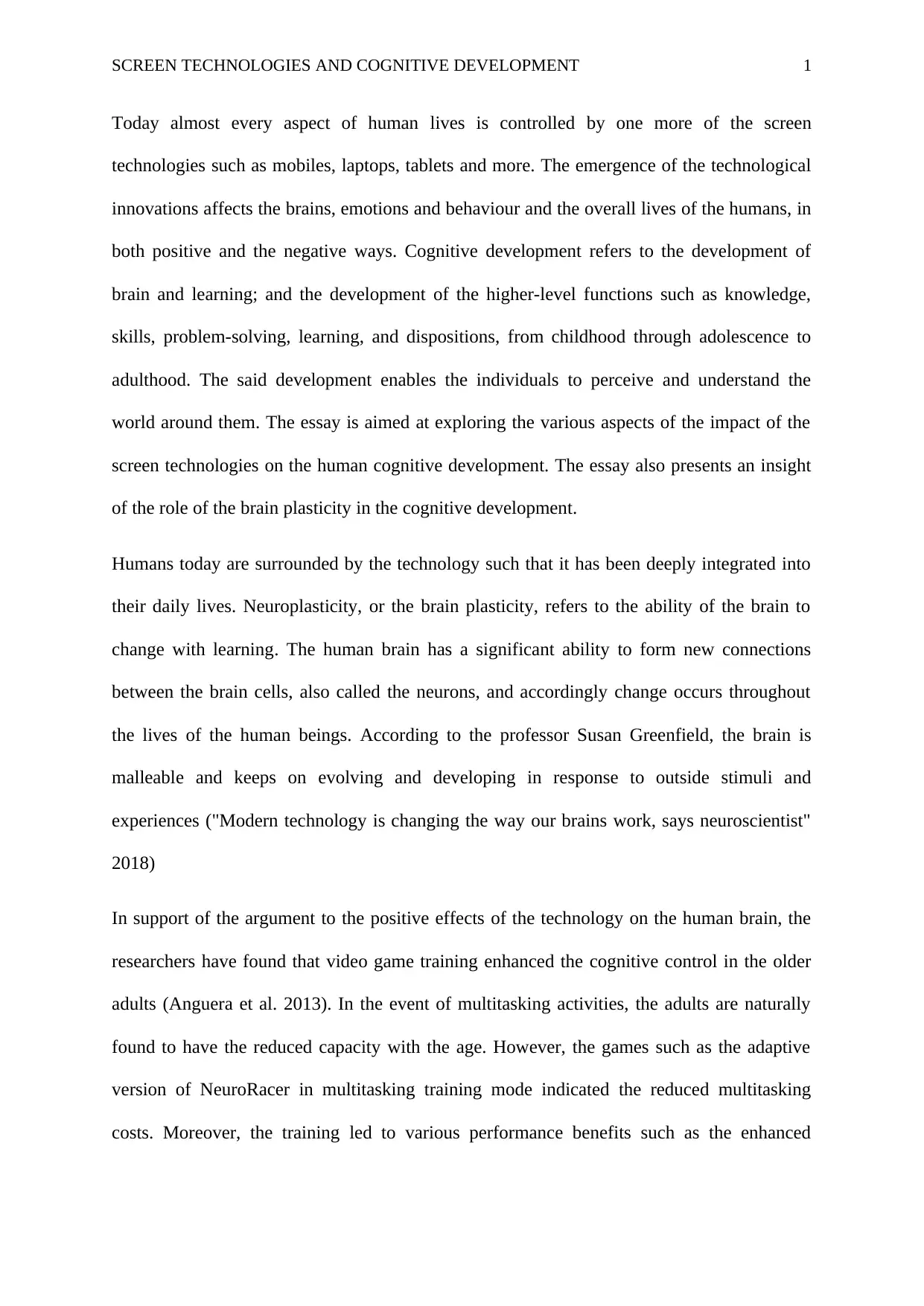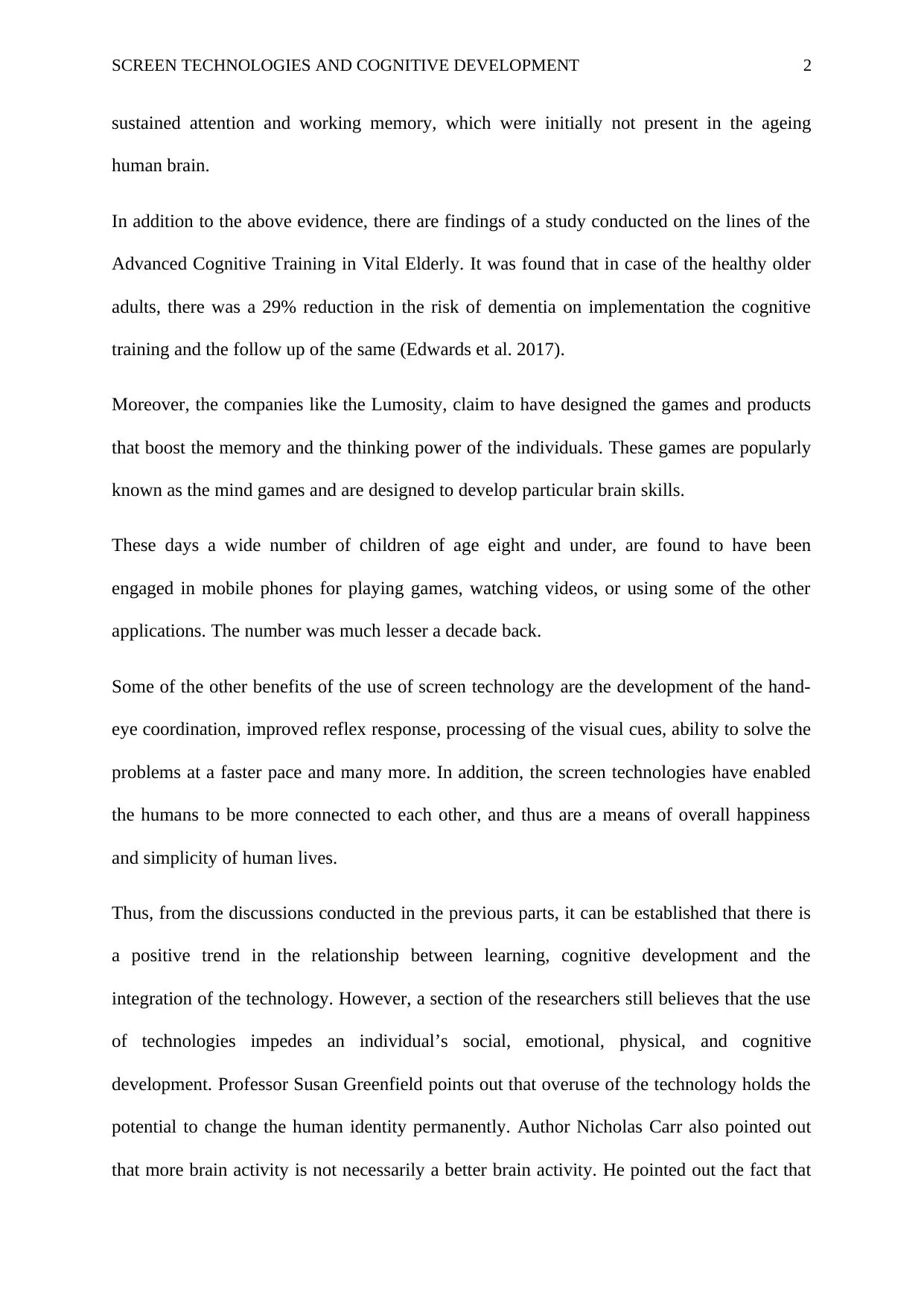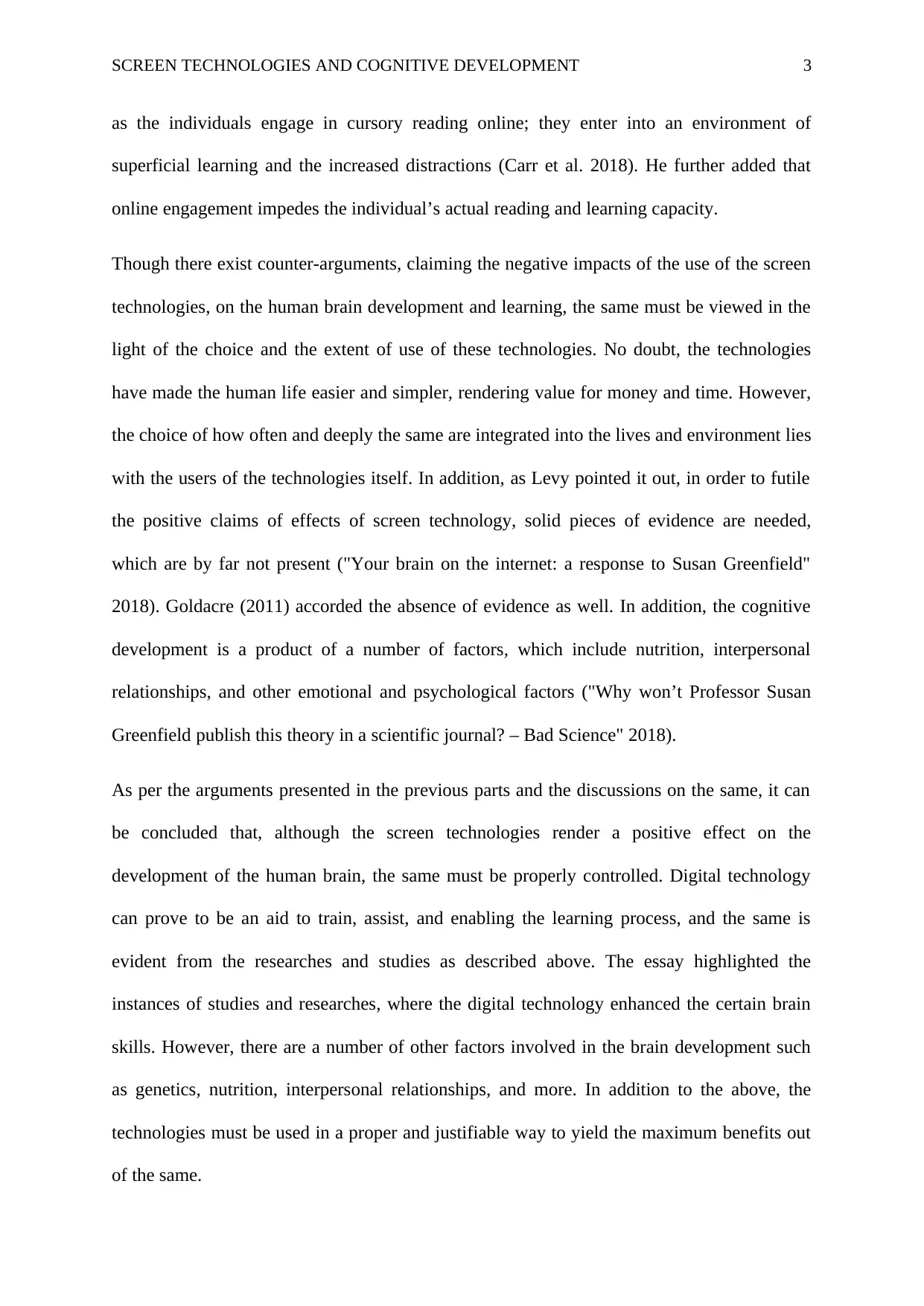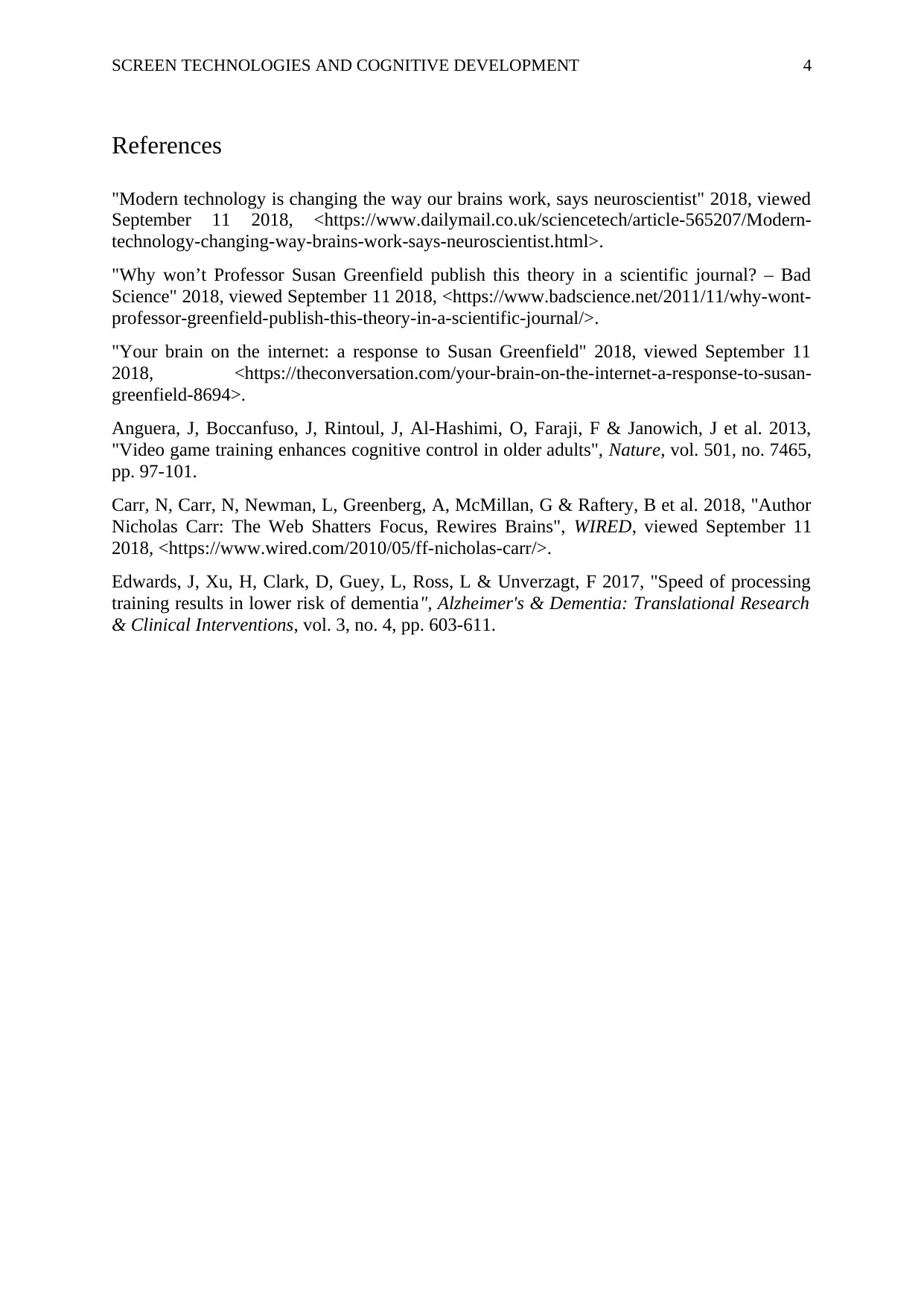The Impact of Screen Technologies on Cognitive Development: An Essay
VerifiedAdded on 2023/06/06
|5
|1410
|443
Essay
AI Summary
This essay investigates the multifaceted impact of screen technologies on human cognitive development. It begins by outlining the influence of devices like mobiles, laptops, and tablets on brain function, emotions, and behavior, both positively and negatively. The essay explores the concept of neuroplasticity, highlighting the brain's ability to adapt and change in response to external stimuli and experiences. It presents research supporting the benefits of technology, such as enhanced cognitive control through video game training and reduced risk of dementia through cognitive training programs. However, the essay also addresses concerns about potential negative impacts, including superficial learning and increased distractions. The author concludes that, while screen technologies can aid learning, their use should be properly controlled, considering factors like nutrition and interpersonal relationships. The essay references several studies and publications to support its arguments, offering a comprehensive analysis of the topic.

08 September 2018
Introduction to Academic Communication
Introduction to Academic Communication
Paraphrase This Document
Need a fresh take? Get an instant paraphrase of this document with our AI Paraphraser

SCREEN TECHNOLOGIES AND COGNITIVE DEVELOPMENT 1
Today almost every aspect of human lives is controlled by one more of the screen
technologies such as mobiles, laptops, tablets and more. The emergence of the technological
innovations affects the brains, emotions and behaviour and the overall lives of the humans, in
both positive and the negative ways. Cognitive development refers to the development of
brain and learning; and the development of the higher-level functions such as knowledge,
skills, problem-solving, learning, and dispositions, from childhood through adolescence to
adulthood. The said development enables the individuals to perceive and understand the
world around them. The essay is aimed at exploring the various aspects of the impact of the
screen technologies on the human cognitive development. The essay also presents an insight
of the role of the brain plasticity in the cognitive development.
Humans today are surrounded by the technology such that it has been deeply integrated into
their daily lives. Neuroplasticity, or the brain plasticity, refers to the ability of the brain to
change with learning. The human brain has a significant ability to form new connections
between the brain cells, also called the neurons, and accordingly change occurs throughout
the lives of the human beings. According to the professor Susan Greenfield, the brain is
malleable and keeps on evolving and developing in response to outside stimuli and
experiences ("Modern technology is changing the way our brains work, says neuroscientist"
2018)
In support of the argument to the positive effects of the technology on the human brain, the
researchers have found that video game training enhanced the cognitive control in the older
adults (Anguera et al. 2013). In the event of multitasking activities, the adults are naturally
found to have the reduced capacity with the age. However, the games such as the adaptive
version of NeuroRacer in multitasking training mode indicated the reduced multitasking
costs. Moreover, the training led to various performance benefits such as the enhanced
Today almost every aspect of human lives is controlled by one more of the screen
technologies such as mobiles, laptops, tablets and more. The emergence of the technological
innovations affects the brains, emotions and behaviour and the overall lives of the humans, in
both positive and the negative ways. Cognitive development refers to the development of
brain and learning; and the development of the higher-level functions such as knowledge,
skills, problem-solving, learning, and dispositions, from childhood through adolescence to
adulthood. The said development enables the individuals to perceive and understand the
world around them. The essay is aimed at exploring the various aspects of the impact of the
screen technologies on the human cognitive development. The essay also presents an insight
of the role of the brain plasticity in the cognitive development.
Humans today are surrounded by the technology such that it has been deeply integrated into
their daily lives. Neuroplasticity, or the brain plasticity, refers to the ability of the brain to
change with learning. The human brain has a significant ability to form new connections
between the brain cells, also called the neurons, and accordingly change occurs throughout
the lives of the human beings. According to the professor Susan Greenfield, the brain is
malleable and keeps on evolving and developing in response to outside stimuli and
experiences ("Modern technology is changing the way our brains work, says neuroscientist"
2018)
In support of the argument to the positive effects of the technology on the human brain, the
researchers have found that video game training enhanced the cognitive control in the older
adults (Anguera et al. 2013). In the event of multitasking activities, the adults are naturally
found to have the reduced capacity with the age. However, the games such as the adaptive
version of NeuroRacer in multitasking training mode indicated the reduced multitasking
costs. Moreover, the training led to various performance benefits such as the enhanced

SCREEN TECHNOLOGIES AND COGNITIVE DEVELOPMENT 2
sustained attention and working memory, which were initially not present in the ageing
human brain.
In addition to the above evidence, there are findings of a study conducted on the lines of the
Advanced Cognitive Training in Vital Elderly. It was found that in case of the healthy older
adults, there was a 29% reduction in the risk of dementia on implementation the cognitive
training and the follow up of the same (Edwards et al. 2017).
Moreover, the companies like the Lumosity, claim to have designed the games and products
that boost the memory and the thinking power of the individuals. These games are popularly
known as the mind games and are designed to develop particular brain skills.
These days a wide number of children of age eight and under, are found to have been
engaged in mobile phones for playing games, watching videos, or using some of the other
applications. The number was much lesser a decade back.
Some of the other benefits of the use of screen technology are the development of the hand-
eye coordination, improved reflex response, processing of the visual cues, ability to solve the
problems at a faster pace and many more. In addition, the screen technologies have enabled
the humans to be more connected to each other, and thus are a means of overall happiness
and simplicity of human lives.
Thus, from the discussions conducted in the previous parts, it can be established that there is
a positive trend in the relationship between learning, cognitive development and the
integration of the technology. However, a section of the researchers still believes that the use
of technologies impedes an individual’s social, emotional, physical, and cognitive
development. Professor Susan Greenfield points out that overuse of the technology holds the
potential to change the human identity permanently. Author Nicholas Carr also pointed out
that more brain activity is not necessarily a better brain activity. He pointed out the fact that
sustained attention and working memory, which were initially not present in the ageing
human brain.
In addition to the above evidence, there are findings of a study conducted on the lines of the
Advanced Cognitive Training in Vital Elderly. It was found that in case of the healthy older
adults, there was a 29% reduction in the risk of dementia on implementation the cognitive
training and the follow up of the same (Edwards et al. 2017).
Moreover, the companies like the Lumosity, claim to have designed the games and products
that boost the memory and the thinking power of the individuals. These games are popularly
known as the mind games and are designed to develop particular brain skills.
These days a wide number of children of age eight and under, are found to have been
engaged in mobile phones for playing games, watching videos, or using some of the other
applications. The number was much lesser a decade back.
Some of the other benefits of the use of screen technology are the development of the hand-
eye coordination, improved reflex response, processing of the visual cues, ability to solve the
problems at a faster pace and many more. In addition, the screen technologies have enabled
the humans to be more connected to each other, and thus are a means of overall happiness
and simplicity of human lives.
Thus, from the discussions conducted in the previous parts, it can be established that there is
a positive trend in the relationship between learning, cognitive development and the
integration of the technology. However, a section of the researchers still believes that the use
of technologies impedes an individual’s social, emotional, physical, and cognitive
development. Professor Susan Greenfield points out that overuse of the technology holds the
potential to change the human identity permanently. Author Nicholas Carr also pointed out
that more brain activity is not necessarily a better brain activity. He pointed out the fact that
⊘ This is a preview!⊘
Do you want full access?
Subscribe today to unlock all pages.

Trusted by 1+ million students worldwide

SCREEN TECHNOLOGIES AND COGNITIVE DEVELOPMENT 3
as the individuals engage in cursory reading online; they enter into an environment of
superficial learning and the increased distractions (Carr et al. 2018). He further added that
online engagement impedes the individual’s actual reading and learning capacity.
Though there exist counter-arguments, claiming the negative impacts of the use of the screen
technologies, on the human brain development and learning, the same must be viewed in the
light of the choice and the extent of use of these technologies. No doubt, the technologies
have made the human life easier and simpler, rendering value for money and time. However,
the choice of how often and deeply the same are integrated into the lives and environment lies
with the users of the technologies itself. In addition, as Levy pointed it out, in order to futile
the positive claims of effects of screen technology, solid pieces of evidence are needed,
which are by far not present ("Your brain on the internet: a response to Susan Greenfield"
2018). Goldacre (2011) accorded the absence of evidence as well. In addition, the cognitive
development is a product of a number of factors, which include nutrition, interpersonal
relationships, and other emotional and psychological factors ("Why won’t Professor Susan
Greenfield publish this theory in a scientific journal? – Bad Science" 2018).
As per the arguments presented in the previous parts and the discussions on the same, it can
be concluded that, although the screen technologies render a positive effect on the
development of the human brain, the same must be properly controlled. Digital technology
can prove to be an aid to train, assist, and enabling the learning process, and the same is
evident from the researches and studies as described above. The essay highlighted the
instances of studies and researches, where the digital technology enhanced the certain brain
skills. However, there are a number of other factors involved in the brain development such
as genetics, nutrition, interpersonal relationships, and more. In addition to the above, the
technologies must be used in a proper and justifiable way to yield the maximum benefits out
of the same.
as the individuals engage in cursory reading online; they enter into an environment of
superficial learning and the increased distractions (Carr et al. 2018). He further added that
online engagement impedes the individual’s actual reading and learning capacity.
Though there exist counter-arguments, claiming the negative impacts of the use of the screen
technologies, on the human brain development and learning, the same must be viewed in the
light of the choice and the extent of use of these technologies. No doubt, the technologies
have made the human life easier and simpler, rendering value for money and time. However,
the choice of how often and deeply the same are integrated into the lives and environment lies
with the users of the technologies itself. In addition, as Levy pointed it out, in order to futile
the positive claims of effects of screen technology, solid pieces of evidence are needed,
which are by far not present ("Your brain on the internet: a response to Susan Greenfield"
2018). Goldacre (2011) accorded the absence of evidence as well. In addition, the cognitive
development is a product of a number of factors, which include nutrition, interpersonal
relationships, and other emotional and psychological factors ("Why won’t Professor Susan
Greenfield publish this theory in a scientific journal? – Bad Science" 2018).
As per the arguments presented in the previous parts and the discussions on the same, it can
be concluded that, although the screen technologies render a positive effect on the
development of the human brain, the same must be properly controlled. Digital technology
can prove to be an aid to train, assist, and enabling the learning process, and the same is
evident from the researches and studies as described above. The essay highlighted the
instances of studies and researches, where the digital technology enhanced the certain brain
skills. However, there are a number of other factors involved in the brain development such
as genetics, nutrition, interpersonal relationships, and more. In addition to the above, the
technologies must be used in a proper and justifiable way to yield the maximum benefits out
of the same.
Paraphrase This Document
Need a fresh take? Get an instant paraphrase of this document with our AI Paraphraser

SCREEN TECHNOLOGIES AND COGNITIVE DEVELOPMENT 4
References
"Modern technology is changing the way our brains work, says neuroscientist" 2018, viewed
September 11 2018, <https://www.dailymail.co.uk/sciencetech/article-565207/Modern-
technology-changing-way-brains-work-says-neuroscientist.html>.
"Why won’t Professor Susan Greenfield publish this theory in a scientific journal? – Bad
Science" 2018, viewed September 11 2018, <https://www.badscience.net/2011/11/why-wont-
professor-greenfield-publish-this-theory-in-a-scientific-journal/>.
"Your brain on the internet: a response to Susan Greenfield" 2018, viewed September 11
2018, <https://theconversation.com/your-brain-on-the-internet-a-response-to-susan-
greenfield-8694>.
Anguera, J, Boccanfuso, J, Rintoul, J, Al-Hashimi, O, Faraji, F & Janowich, J et al. 2013,
"Video game training enhances cognitive control in older adults", Nature, vol. 501, no. 7465,
pp. 97-101.
Carr, N, Carr, N, Newman, L, Greenberg, A, McMillan, G & Raftery, B et al. 2018, "Author
Nicholas Carr: The Web Shatters Focus, Rewires Brains", WIRED, viewed September 11
2018, <https://www.wired.com/2010/05/ff-nicholas-carr/>.
Edwards, J, Xu, H, Clark, D, Guey, L, Ross, L & Unverzagt, F 2017, "Speed of processing
training results in lower risk of dementia", Alzheimer's & Dementia: Translational Research
& Clinical Interventions, vol. 3, no. 4, pp. 603-611.
References
"Modern technology is changing the way our brains work, says neuroscientist" 2018, viewed
September 11 2018, <https://www.dailymail.co.uk/sciencetech/article-565207/Modern-
technology-changing-way-brains-work-says-neuroscientist.html>.
"Why won’t Professor Susan Greenfield publish this theory in a scientific journal? – Bad
Science" 2018, viewed September 11 2018, <https://www.badscience.net/2011/11/why-wont-
professor-greenfield-publish-this-theory-in-a-scientific-journal/>.
"Your brain on the internet: a response to Susan Greenfield" 2018, viewed September 11
2018, <https://theconversation.com/your-brain-on-the-internet-a-response-to-susan-
greenfield-8694>.
Anguera, J, Boccanfuso, J, Rintoul, J, Al-Hashimi, O, Faraji, F & Janowich, J et al. 2013,
"Video game training enhances cognitive control in older adults", Nature, vol. 501, no. 7465,
pp. 97-101.
Carr, N, Carr, N, Newman, L, Greenberg, A, McMillan, G & Raftery, B et al. 2018, "Author
Nicholas Carr: The Web Shatters Focus, Rewires Brains", WIRED, viewed September 11
2018, <https://www.wired.com/2010/05/ff-nicholas-carr/>.
Edwards, J, Xu, H, Clark, D, Guey, L, Ross, L & Unverzagt, F 2017, "Speed of processing
training results in lower risk of dementia", Alzheimer's & Dementia: Translational Research
& Clinical Interventions, vol. 3, no. 4, pp. 603-611.
1 out of 5
Related Documents
Your All-in-One AI-Powered Toolkit for Academic Success.
+13062052269
info@desklib.com
Available 24*7 on WhatsApp / Email
![[object Object]](/_next/static/media/star-bottom.7253800d.svg)
Unlock your academic potential
Copyright © 2020–2026 A2Z Services. All Rights Reserved. Developed and managed by ZUCOL.





